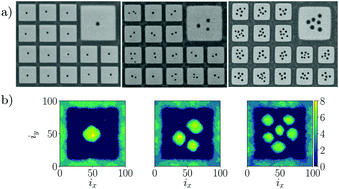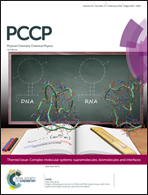Boundary-induced nucleation control: a theoretical perspective
Abstract
The pre-patterning of a substrate to create energetically more attractive or repulsive regions allows one to generate a variety of structures in physical vapor deposition experiments. A particularly interesting structure is generated if the energetically attractive region forms a rectangular grid. For specific combinations of the particle flux, the substrate temperature and the lattice size it is possible to generate exactly one cluster per cell, giving rise to nucleation control. Here, we show that the experimental observations of nucleation control can be very well understood from a theoretical perspective. For this purpose we perform, on the one hand, kinetic Monte Carlo simulations and, on the other hand, use analytical scaling arguments to rationalize the observed behavior. For several observables, characterizing nucleation control, very good agreement is found between experiment and theory. This underlines the generality of the presented mechanism to control the deposition of materials by manipulation of the direct environment.



 Please wait while we load your content...
Please wait while we load your content...